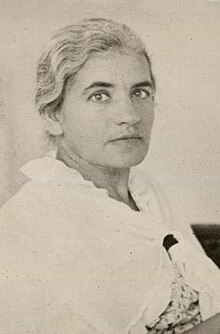Zenta Mauriņa
You can help expand this article with text translated from the corresponding article in Latvian. (December 2008) Click [show] for important translation instructions.
|
Zenta Mauriņa | |
|---|---|
 Mauriņa in 1930 | |
| Born | 15 December 1897[1] Lejasciems, Governorate of Livonia, Russian Empire (Now |
| Died | 25 April 1978 (aged 80)[1] Basel, Switzerland[1] |
| Occupation | writer, essayist |
| Nationality | Latvian |
| Genre | Prose |
| Spouse | Konstantīns Raudive |

Zenta Mauriņa (15 December 1897 – 25 April 1978) was a Latvian writer, essayist, translator, and researcher in philology.[2] She was married to the Electronic Voice Phenomena researcher Konstantin Raudive.[3] She was nominated for the 1973 Nobel Prize in Literature.[4]
Biography[edit]
Born to doctor Roberts Mauriņš, Zenta spent her childhood in Grobiņa, where, at the age of six, she contracted polio, leaving her confined to a wheelchair for the rest of her life.[1] After studying at the Russian girls' high school in Liepaja (1913–1915), she studied philosophy at the Latvian University in Riga (1921–1923).[1] After this, she studied philology of Baltic languages (1923–1927). She taught at the Latvian Teachers Institute and at the Latvian University in Riga and in Murmuiza, and achieved her doctorate in philology in 1938, researching the works of Latvian poet and philosopher, Fricis Bārda.
At the end of the Second World War, Mauriņa went into exile, first in Germany in 1944, and in 1946 in Sweden, where she became a lecturer at Uppsala University (1949–1963). In 1966, she moved to Bad Krozingen in southern Germany, where she was buried after her death in a hospital in Basel, Switzerland.[1]
Works[edit]
Up to 1944, Mauriņa published 19 books in Latvia, including monographs on Latvian writers Rainis, Jānis Poruks, Anna Brigadere and Fricis Bārda, as well as on Dostoyevsky and Dante. During this period, she also wrote her novel, Life on a Train (1941). After the war, she published 20 books in Latvian, and 27 in German, and her works have been widely translated into Italian, English, Russian, Swedish, Dutch, Finnish and Danish. Notable among her works in German are:
- The Long Journey (Die weite Fahrt) (her autobiography)
- A Prophet of the Soul: Fyodor Dostoievsky (a biography, translated from the Latvian by C. P. Finlayson)
- Heart mosaic (Mosaik des Herzens) (essays)
- In the beginning, was joy (Im Anfang war die Freude) (short stories)
- A loved life – a lived life (Geliebtes Leben – gelebtes Leben) (essays)
- A Portrait of Russian Writers (Porträts russischer Schriftsteller) (essays)
Awards[edit]
- Officer Cross, of the Order of Merit of the Federal Republic of Germany (1968)
- PBLA (World Free Latvians Association) Award (1969)
- Konrad Adenauer Prize, for literature (1971)
- Honorary citizen of Bad Krozingen (1977)
References[edit]
- ^ a b c d e f g Zenta Maurina. International Biographical Archive (15 May 1978)
- ^ Eng.LSM.lv (26 October 2022). "Stamp to honor distinguished Latvian writer Zenta Mauriņa". eng.lsm.lv. Public Broadcasting of Latvia. Retrieved 29 October 2022.
- ^ *Rožkalne, Anita; LU literatūras; folkloras un mākslas institūts (2003). Latviešu rakstniecība biogrāfijās (in Latvian). Riga: Zinātne. ISBN 9984-698-48-3. OCLC 54799673.
- ^ "Nomination Archive - Zenta Maurina". NobelPrize.org. March 2024. Retrieved 14 March 2024.
- 1897 births
- 1978 deaths
- People from Gulbene Municipality
- People from Kreis Walk
- 20th-century Latvian women writers
- 20th-century philologists
- Women philologists
- Latvian translators
- Translators from Latvian
- Translators to Latvian
- Women linguists
- Latvian philologists
- 20th-century translators
- University of Latvia alumni
- Latvian World War II refugees
- Latvian emigrants to Sweden
- Officers Crosses of the Order of Merit of the Federal Republic of Germany
